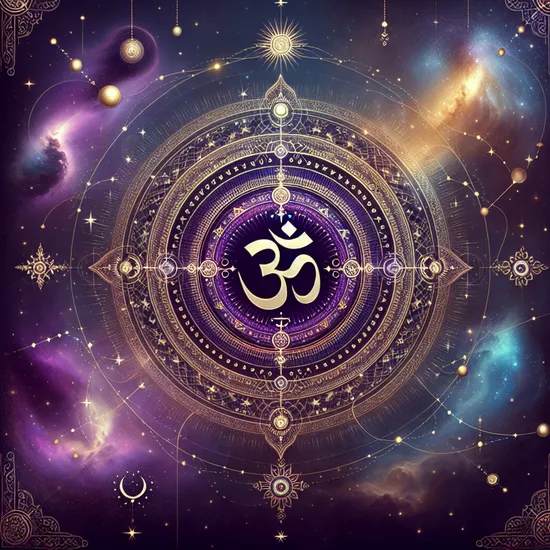Aum - Meaning, Origin, Usage and Cultural Significance
Understanding the Meaning
The name Aum is deeply rooted in spiritual and religious traditions, symbolizing the cosmic sound or vibration and considered as a mantra or prayer in many cultures. Its meaning encompasses the essence of the ultimate reality, conscious moment, and self-fulfillment. Powerfully symbolic, it represents creation, preservation, and destruction, embodying the cycle of life and the interconnectedness of all things.
Find more names related to the name Aum.
Peace,
Spirit,
Strong,
Truth,
Indian,
Sanskrit,
Pronunciation of ॐ in Sanskrit
/oːm/ - ॐ
- /oː/: pronounced like the 'o' in 'more', elongated
- /m/: the nasal sound 'm'
The pronunciation resembles 'ome', with a prolonged 'o' followed by a soft 'm', encompassing a resonant, soothing sound.
Tracing the Origin
The name Aum originates from Sanskrit, a classical language of India. Often associated with Hindu, Buddhist, and Jain traditions, it's a sacred syllable in these religious practices. The pronunciation and usage have spread globally, becoming an emblem of universal peace and spiritual oneness. Its roots are strongly tied to the ancient spiritual and cultural practices of the Indian subcontinent.
Gender Neutrality
Aum is considered a gender-neutral name, making it suitable for any gender. Its universal spiritual significance transcends gender classifications, aligning with the notion of a universal soul. While predominantly used in India, its spiritual connotation makes it popular among diverse cultures globally. It has been chosen by individuals across different genders, reflecting its inclusivity and holistic appeal.
Popularity Over Time
The name Aum is not exceedingly common but holds a stable place within communities valuing spirituality and tradition. While more popular in India and regions influenced by Indian culture, it has gained recognition in the west for its deep spiritual resonance. Its popularity has seen a mild increase over recent years as more people embrace its holistic meaning and cultural richness.
Global Usage and Variations
Usage of Aum extends beyond India, resonating in spiritual communities worldwide, including in North America and Europe. While pronunciation remains largely consistent, some cultures may adapt it phonetically. Its universal spiritual significance as a mantra makes it prevalent across diverse cultures, symbolizing peace and mindfulness.
| Global Distribution and Gender Ratio of the Name Aum |
| Country |
Usage % |
Female % |
Male % |
| TH |
93.59% |
67.26% |
32.74% |
| US |
1.39% |
30% |
70% |
| IN |
0.7% |
0% |
100% |
| GB |
0.7% |
60% |
40% |
| AU |
0.7% |
40% |
60% |
Analysis of name gender and popularity is derived from data provided by
Gender API.
Associated Personality Traits
- Mindfulness : Individuals with this name often have a strong inclination towards meditation and mindfulness, reflecting its spiritual roots.
- Harmony : They are perceived to emulate harmony with the world, drawing on the universal essence of the name.
- Intuition : Those named Aum might possess heightened intuitive abilities, aligning with its mystical and philosophical connotations.
Professional Pathways
- Spiritual Leader : Many with the name may pursue roles in religious or spiritual leadership.
- Philosopher : The name's profound significance often leads individuals into the realms of philosophy and religious studies.
- Artist : Those named Aum may find their calling in creative fields, harnessing their intuitive and mindful nature.
Unique Facts and Cultural Impact
- Symbol in Yoga : The name holds a central place in yoga practices, often used in chants and meditative exercises.
- Used in Popular Media : Symbolized in numerous spiritual texts, it occasionally appears in films or literature focusing on spirituality or Eastern philosophies.
Notable Persons Named Aum
- Aum Namah Sivaya: Sacred chant whose spiritual significance aids in meditation and spiritual practice.
Similar Names
-
Om: A closely related name signifying the sound of the universe, often used interchangeably with Aum in spiritual contexts.
-
Shant: Another name rooted in spiritual traditions, meaning peace, and offering similar calming and mystical connotations.
-
Mantra: Related to the idea of sacred sounds and chants, carrying a sense of divine power or expression.
-
Samadhi: Reflects the state of intense concentration or meditation, aligning with the tranquility associated with Aum.
-
Nirvana: Evokes notions of achieving transcendence or liberation, akin to the holistic essence of Aum.
-
Yoga: Symbolizing union or connection, it aligns with the interconnectedness Aum represents.
-
Satya: Meaning truth, it complements the spiritual authenticity embodied by Aum.
-
Arya: Denotes nobility or esteem, reflecting the honorable and respectful paths those named Aum often follow.
-
Dharma: Implies a sense of law or dutiful living, corresponding with the sense of purpose often associated with Aum.
-
Gyan: Translates to knowledge, resonating with the enlightenment and wisdom associated with the name Aum.
